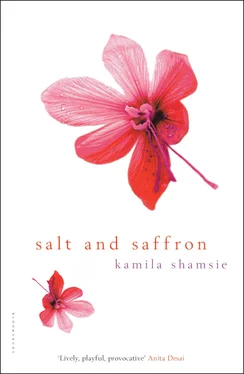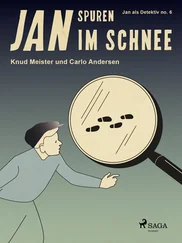Hibiscus-Eating Ayah’s good-natured youthfulness was such a pleasant contrast to Niswaar -Spitting Ayah that I would stay up at night, past my bedtime, whispering to her about the house I’d own one day when I was married. We’d draw up floor plans for the house, which varied from week to week in every detail but one: a little room for her, between my room and my children’s room, so that she could be on hand for whoever needed her to sing them to sleep.
But the plans went awry the day she ate the hibiscus.
I was in my room when I heard sounds of pandemonium in the garden, outside the dining room. On going to investigate I saw Mariam Apa, ashen, staring at Bua in disbelief, while Masood yelled. At first I didn’t know which of the two women he was yelling at, just that he was demanding, ‘What were you thinking? What have you done? What sort of bestiality is this?’ The thought that he could be addressing Mariam Apa in this manner made the blood rush to my head, until I realized, that’s impossible. He’d get fired for that. I moved closer to the dining-room window to look out, and saw that the red flowers of Mariam Apa’s hibiscus bush were lying on the grass, ripped apart. Moving closer still, I saw teeth marks in petals, saw red on Bua’s teeth when she opened her mouth to speak.
‘Look at her,’ she said, and pointed at Mariam. ‘Look at that look on her face. She shows more emotion over these flowers than over anything else. Why can’t you see that? She’s a mad woman, deranged.’
‘Aliya!’ Just as things got interesting Ami appeared, on cue, and whisked me away. That day, Bua earned a nickname and lost a job. And gained another, because Younger Starch, driving to our house, saw Hibiscus-Eating Ayah leaving and hired her on the spot. No one quite understood why Younger Starch did that until a few months later, when she announced she was pregnant. She said, ‘I told him I’m not having children until I know I have the right kind of help for those horrible first months of a child’s life, but once I found Bua I said, “Hubby, let’s go.” ’
I thought I would never forgive Hibiscus-Eating Ayah for the things she said about Mariam Apa, but Mariam was in such a good mood in the days following the insults that I concluded she hadn’t minded them at all, and I was free to continue to feel affection for my old ayah. In the fifteen years since, my affection had never died, but it had become something I never thought about unless I saw her face to face.
I opened the door to the children’s bedroom.
‘Arré, Aliya!’ Hibiscus-Eating Ayah was folding my young cousins’ clothes, but when she saw me she dropped a T-shirt on to the bed and came over to hug me and whisper prayers over my head. ‘I knew you wouldn’t let me leave without coming to say goodbye.’
‘Goodbye? Why?’
‘Didn’t anyone tell you? I’m leaving. Going to work for the Shaikh family who live near the KESC building. Three children, ages five to nine, and none of them as sweet as you were at that age.’
‘But, you mean, my aunt’s decided she doesn’t need an ayah any more? How can that be? Imdi’s only eight. How can she do this to you?’
‘Aren’t you listening? I’m leaving. She doesn’t want me to go, but she doesn’t want to pay me as much as the Shaikhs are offering either.’
‘You’re leaving only because of money? Bua, you’ve raised these children. All four, since the day they were born.’
‘Leh!’ she said, pointing at me as though I were a sideshow freak and she was directing the assembled gawkers’ attention to me. ‘Only because of money! I have two granddaughters. Their stepfather is a waster; he just wants to get them married off when they reach puberty, and my daughter — you know Khadija — has always been spineless. She said, “What can I say to him? He doesn’t want to bear the expense.” So I said, “Then I’ll bear the expense. I’ll send them to school.” The eldest is so smart, and there’s a school near where they live where they teach English and they even have computers. Ye-es. You think I’m joking? Some rich man donated all these computers to them. Only money! You think I’m going to let my grandchildren grow up to be servants?’
‘I’m sorry, I didn’t …’
She waved me quiet. ‘Oh, I’m only this upset because I feel bad about leaving here. You said it yourself. I raised these children.’
Something she had said earlier had caught my attention. ‘You said stepfather? What happened to Khadija’s first husband? Divorce?’
‘Two years ago it happened. No one told you? He was killed in police custody. Where he used to live — it’s a poor part of town, not like this — at least one person per family is killed in police custody. Allah, take pity on us.’
‘On all of us,’ I said. On my way to school, during my A levels, I used to see Khadija’s husband playing cricket on the streets. He’d raise his bat in greeting as my car went by. When my American friends said arranged marriages were a horrific notion I always thought of the way Khadija leant against her young husband’s shoulder when I saw them together visiting her mother at Younger Starch’s. He was, he would have been, Sameer’s age.
I felt too sick to ask Hibiscus-Eating Ayah anything else. What could she tell me, in any case? ‘I have to go. Come and visit me. The Shaikhs don’t live so far away.’
‘Yes,’ she said. ‘And it’s been a long time since there was a reason to stay away from your house.’
She looked squarely at me and I saw I was not the only one with questions.
‘We haven’t heard from either of them since they left.’
She nodded. ‘I didn’t think she’d ever do it. That’s what made me angry all those years ago. Not that he stopped noticing me as soon as she walked into the kitchen, but that she knew it and yet she wasn’t willing to stop walking in or to tell him to stop looking. The third thing, the thing she finally did, that I didn’t think she’d ever do. But, after the shock when I first heard of it, I wasn’t that surprised. The way Masood had of looking at her … How could you ever give up being looked at like that?’
Why did none of us see what Hibiscus-Eating Ayah saw? The question nagged me for days. And then Meher Dadi dropped a chance remark to Sameer, about ghosts. ‘I’ve seen them. Of course I’ve seen them. Not often, but every now and then. You say that, because I believe they exist, I allow my mind to play tricks and create them, but, dear boy, perhaps you don’t see them because you’re unwilling to acknowledge the possibility that they might exist.’
Of course.
But what made Mariam Apa so different? What made her able to acknowledge possibilities more unlikely than ghosts? Did Taimur really become a servant — while we’re admitting possibilities, why not admit that? Was Mariam’s mother far beneath the Dard-e-Dils on the social ladder, as Dadi believed? Or might there be a possibility unrelated to her parents?
The only clue we had to Mariam Apa’s life before Karachi was the letter which had arrived at our house, twenty-two years ago, just minutes before she did. If only Ami had saved the envelope we might have known where it came from. I only want to say take care of her because even though she may come back here if you don’t and that will make me happy I do not want her to be sad and so please make her happy. And also this way I can dream but when she is here I can only wait for what is never.
Someone had loved Mariam Apa before Karachi. Someone who might not have been literate — the letter, Aba insisted, sounded like an oral message transcribed. But Mariam Apa had not loved this man, had not even allowed him to think that maybe one day she would. What made him so convinced that he was waiting ‘for what is never’? Who was this man? He was from Dard-e-Dil or the regions around it, else why would he have started the letter with the formal greeting and respectful address: Huzoor! Aadaab! Unless Taimur taught him that …
Читать дальше












